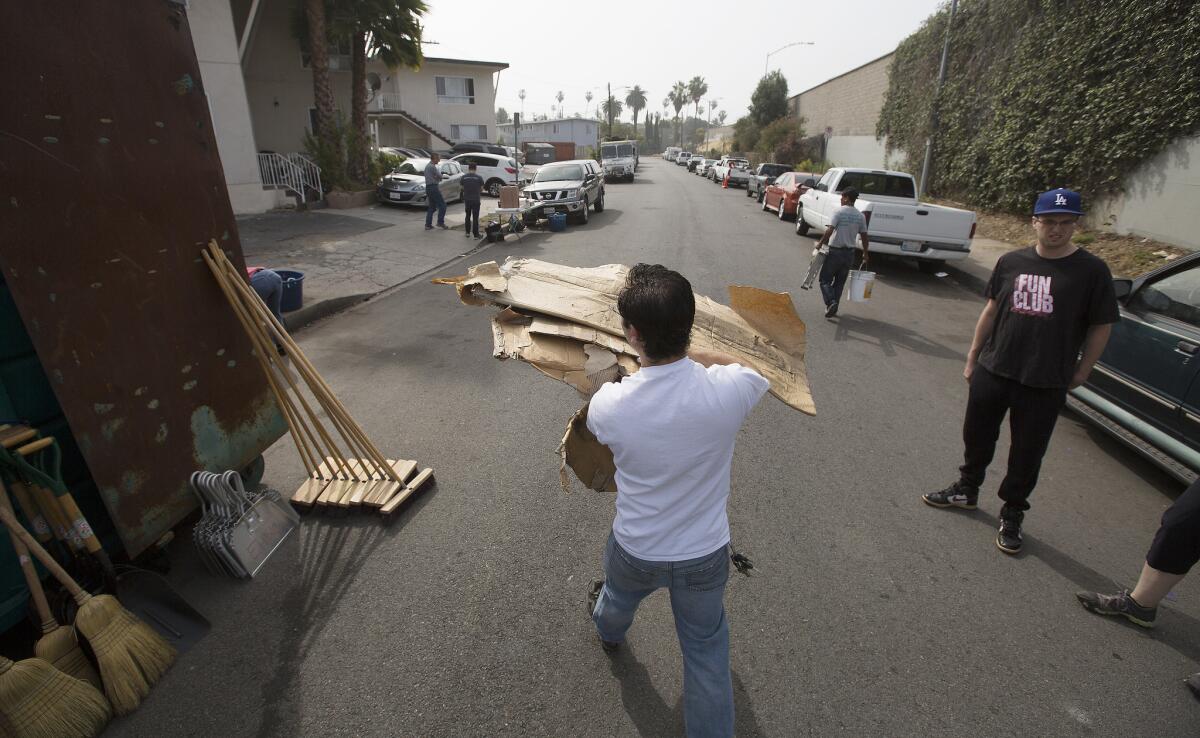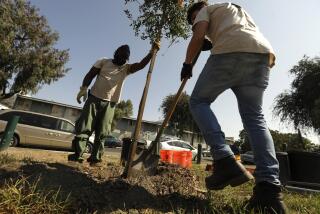Poll finds L.A. County residents want to be more involved in their community but don’t have time

A team of volunteers clean up Kingsley Street in a monthly meet-up organized by the East Hollywood Neighborhood Council.
Living in Los Angeles County can be challenging -- inching to and from work in endless traffic jams that chip away at your leisure time, struggling with the rising cost of keeping a roof over your head.
A new USC Dornsife/California Community Foundation/Los Angeles Times poll suggests the complications of daily existence in this vast urban area may affect residents’ ability and willingness to get more involved in their communities.
Nearly half of those surveyed -- 49% -- said one of the main reasons they weren’t more involved is because they were too busy and did not have enough time, while 39% said they weren’t sure what they could do to help.
Linda Hopkins, 61, a former human resources manager for the county, said those two roadblocks help explain why she hasn’t played an active role in Carson, where she’s lived since 1983.
Until she retired in 2011, she said, she left her home by 6:30 every weekday morning to drive to downtown L.A. and often didn’t crawl her way back until 8 p.m. Weekends were crammed with catch-up chores and spending time with her husband and two sons.
Hopkins is very involved with projects at her South Los Angeles church. Now she’d like to find a way to contribute her energies to Carson too, she said, but “quite frankly, I’ve never really connected with the city.”
The poll of 1,500 adults, conducted online Sept. 10-24, aimed to get a picture of how residents viewed the county and their neighborhoods and of the degree and form of their civic engagement. This survey is a departure from traditional phone polling used for the USC Dornsife/Los Angeles Times poll of California voters.
What do they like most? It was little surprise that survey respondents were in agreement that they appreciate the good weather and climate, followed closely by proximity to the beach and the great outdoors.
Asked what concerned them most, more than half of those polled in the online survey -- 55% -- cited traffic and congestion. It was a worry cited more than any other, including physical safety, personal finances and making ends meet, along with crowded, substandard or unaffordable housing.
Hopkins said she’d seen increased commute times combined with the ever-rising cost of living here impinge on social connections even in the workplace.
“When we first started working, most of us used to do a lot of things together. This generation can’t because they’re driving to Pomona or Chino,” she said.
Pressed for time, stressed by their circumstances, residents made it clear that if they did help out in their communities, they would want to see a clear payoff.
Asked to choose the top reasons they might get more involved, two-thirds of those polled — 67% — said they would do so if they knew it would make a difference. They ranked the efficacy of such do-it-yourself measures as conserving water, recycling more or joining in neighborhood cleanup efforts above getting involved in local government.
Joel Valle, 59, of Canoga Park, is the director of a nonprofit music school. He said he isn’t a rich man and doesn’t have the luxury of simply writing a big check to a charity. Even if he did, though, he said he would prefer to help people more directly. “If you need yourself, you understand what other people need. So if you have clothes or you have food, you share them. It’s not just giving, it’s sharing what you have.”
Valle, who also is involved in a faith-based organization that helps to feed and clothe the West Valley’s needy, knows how and where to jump in and help.

But Cecilia Yang, 29, a laboratory assistant living in Arcadia, said she isn’t so sure, even though she feels a strong sense of civic duty.
Yang was among the 46% of those polled who said they’d gotten involved in their communities in the past at least in part because it made them feel good.
That’s her prime motivation for delivering hot meals once a week to the elderly.
“It’s not really fixing anything,” she said. “I do it for the personal enjoyment, to talk to people and see new faces.”
As for getting more deeply involved, she said she’d like to -- if she knew where to go to get good information. She considers herself research-oriented and said if she’s going to do something, she wants to know why. When her “more environmentally oriented” sister explained the consequences of the state’s drought on the ecosystem, she said, it hit home much more forcefully than public officials’ demands that she and other residents cut back on water usage.
“I’m a cause and effect person,” Yang said. “Knowing the consequences, the big-picture reason, motivates me.”
SIGN UP for our free Essential Politics newsletter >>
Poll director Dan Schnur, head of USC’s Jesse M. Unruh Institute of Politics, said leaders in government and the nonprofit world should take note.
“It’s clear that most people who want to get involved don’t know how to get involved in order to make a difference,” Schnur said. “It’s also clear that they don’t know where to get the necessary guidance.”
Poll respondents were chosen from a pool of people who had registered to participate in online surveys. Because the sample came from a group who initially had self-selected to participate, no sampling error can be calculated. The data was weighted to reflect the demographics of the adult population of Los Angeles County.
ALSO:
Politics at the local level pointless? That’s what many Californians think
Full results of USC/CCF/LAT poll
Q&A: Why we’re experimenting with online polling
For more, go to www.latimes.com/politics.
More to Read
Get the L.A. Times Politics newsletter
Deeply reported insights into legislation, politics and policy from Sacramento, Washington and beyond. In your inbox three times per week.
You may occasionally receive promotional content from the Los Angeles Times.











